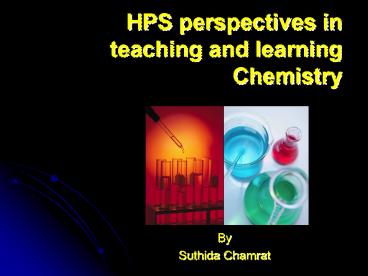HPS perspectives in teaching and learning Chemistry - PowerPoint PPT Presentation
1 / 25
Title:
HPS perspectives in teaching and learning Chemistry
Description:
Not surprisingly, the airship was destroyed in a violent fire near Lakehurst, ... Modern airships are filled with helium. Unlike hydrogen, helium doesn't burn. ... – PowerPoint PPT presentation
Number of Views:54
Avg rating:3.0/5.0
Title: HPS perspectives in teaching and learning Chemistry
1
HPS perspectives inteaching and
learningChemistry
- By
- Suthida Chamrat
2
Out Line
- Introduction role of history and philosophy of
science in science education - Review of the Literature Researches concerning
history and philosophy of science - Teaching and learning chemistry with history and
philosophy of science - Conclusion
3
role of history and philosophy of science in
science education
- History is not a stranger to the science
classroom - Historical case studies allow teachers to convey
an understanding of the nature of science - History provides a context for understanding how
students learn fundamental concepts
4
The important role of history and nature of
science
- The National Research Council's National Science
Education Content Standards - science as a human endeavor
- history of science
- nature of science
5
The important role of history and nature of
science
- History and philosophy of science is valuable
tools for teaching specific concepts more
effectively - Conveying the process of science.
6
The important role of history and nature of
science
- rational from experts view
- Fostering meaningful learningDiscovery of
science as a profession - Improving the image of science,
- Inclusion of relevant and interesting contents
(STS ideas) - Necessity of HPS for construction of a holistic
view on science
(Galili and Hazan,2001).
7
Review of the Literature Researches concerning
history and philosophy of science
8
- Studying the history of the atomic theory should,
therefore, help students understand
atomic/molecular theory
... informative histories of the intellectual
victories that make science so interesting and
relevant. And, I believe, chemistry will prosper
as a result. Harrison, (2002)
9
- Carvalho and Vannucchi (2000) highly recommended
including study of history and philosophy of
science in school science course in order to
generate effective classroom activities. This
provided a more realistic view of science and
enhanced cognitive and argumentation skills,
besides emphasizing the importance of teachers
guidance.
10
- history and philosophy of science is already
inside chemistry and this perspective can
facilitate students conceptual understanding - Niaz and Rodriguez (2001)
11
- Historical reconstructions of atomic models can
provide students an opportunity to appreciate how
scientists work and science progresses. It is
plausible to suggest that textbook presentations
based on a history and philosophy of science
perspective can perhaps arouse students interest
in the subject and hence lead to greater
conceptual understanding. - Niaz and Rodriguez (2004)
12
- The history of chemistry needs a philosophy to
explain why and how scientists changed their
conceptual and explanatory models. The image
students develop of science and its processes is
enriched when they share customized accounts of
chemical revolutions like Daltons atomic theory
and Bohrs quantized explanation of hydrogens
spectra.
Harrison(2003)
13
- History and philosophy of science is already in
the science curriculum and we do not have to
design a separate course but rather rewrite the
textbooks in order to incorporate the history and
philosophy of science explicitly. - (Naiz,2000, Maria, 2002).
14
Teaching and learning chemistry with history and
philosophy of science
15
Teaching learning chemistry
chemistry has a fascinating story to tell
16
Teaching matter and molecules
- Did you know that the 18th-century French chemist
who is widely considered the father of modern
chemistry was beheaded during the French
Revolution? - Can you name the only Nobel laureate in chemistry
to also win a Nobel Peace Prize?
17
Teaching matter and molecules
- 18th century to today student have learnt
- The discovery of oxygen
- The development of the periodic table
- The uncovering of the DNA double helix
18
The Chemistry Blimp
- Gas Law
- Gay-Lussacs law
19
Questioning
- The German zeppelin Hindenburg was filled with
hydrogen gas. Not surprisingly, the airship was
destroyed in a violent fire near Lakehurst, New
Jersey, in 1937. - - Write a balanced chemical reaction for
the combustion of hydrogen. - - Is this reaction exothermic or
endothermic?
20
Questioning
- Modern airships are filled with helium. Unlike
hydrogen, helium doesn't burn. Use your knowledge
of valence electron configurations to explain why
helium is safer than hydrogen for use in
airships. - Balloons are usually filled with simple hot air
instead of helium. Use the ideal gas law to
explain why a hot air balloon floats.
21
best ways to incorporate HPS suggested by the
experts
- Reproduction of historical experiments,
- Presentation of original historical texts,
- Infusion of stories during regular instruction,
- Systematic incorporation of historical materials,
- Historical references ("dates and names") where
required
(Galili and Hazan,2001).
22
Conclusion
23
Summarize the reasons for the inclusion of HPS
in learning teaching science
- Better understanding of scientific concepts and
methods - Connection between development of individual
thinking with development of scientific ideas - Cultural-intellectual validity
- Understanding of nature of science
Matthews (1994, p. 50)
24
Summarize the reasons for the inclusion of HPS
in learning teaching science
- Counteracting scientism and dogmatism (common in
science education) - Humanizing scientific contents, reduction of
formalism - Presenting integrative and interdependent nature
of human achievements.
Matthews (1994, p. 50)
25
Thank You































